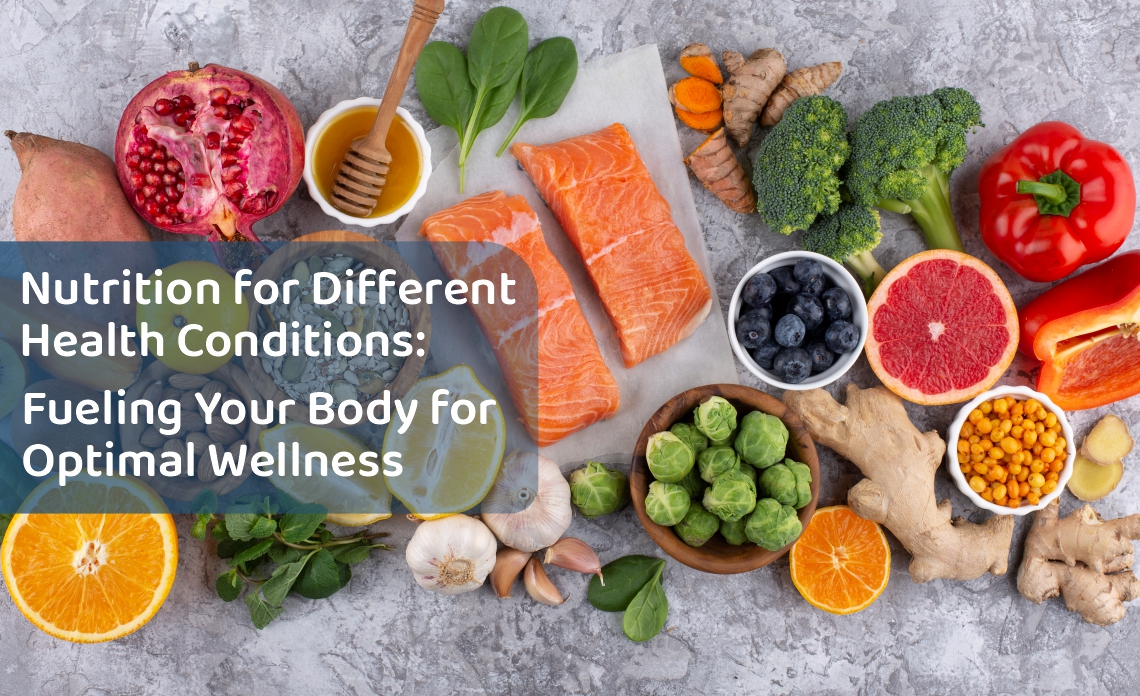
Nutrition is extremely important in sustaining overall health and well-being. What we consume has a significant influence on our bodies, affecting not only our energy levels but also our susceptibility to various health conditions. Let us explore how nutrition can be tailored to address different health conditions. Whether you are managing a chronic illness or striving for better general health, understanding how nutrition can support your specific needs is essential.
Diabetes:
Diabetes is a chronic illness marked by high blood sugar levels. Proper diet is essential for optimal diabetes management.
- Carbohydrate Control: Monitor your carbohydrate intake and choose complex carbohydrates like whole grains, legumes, and vegetables.
- Fibre-Rich Foods: Include fibre-rich foods to help stabilise blood sugar levels.
- Healthy Fats: Opt for unsaturated fats like those found in avocados, nuts, and olive oil.
- Portion Control: Pay attention to portion sizes to avoid blood sugar spikes.
- Limit Sugar: Minimise sugary snacks and drinks.
Heart Health:
A heart-healthy diet can help reduce the risk of cardiovascular diseases, such as heart attack and stroke.
- Low Sodium: Limit salt intake to reduce high blood pressure.
- Omega-3 Fatty Acids: Incorporate fatty fish like salmon and flaxseeds for their heart-protective properties.
- Fruits and Vegetables: Consume a variety of colourful fruits and vegetables produce rich in antioxidants.
- Whole Grains: Choose whole grains over refined grains for added fibre and nutrients.
Arthritis:
Arthritis can cause joint pain and inflammation, but nutrition can help manage these symptoms.
- Omega-3s: Fish oil supplements or fatty fish like salmon can help reduce inflammation.
- Antioxidants: Berries, spinach, and nuts are packed with antioxidants to combat inflammation.
- Turmeric: This spice contains curcumin, known for its anti-inflammatory properties.
- Calcium and Vitamin D: Support bone health with dairy or fortified alternatives.
Gut Health:
A healthy gut is essential for overall well-being, and nutrition plays a pivotal role in maintaining it.
- Probiotics: Yogurt, kefir, and fermented foods promote the growth of beneficial gut bacteria.
- High-Fiber Foods: Beans, whole grains, and fruits support digestive health.
- Prebiotics: Garlic, onions, and leeks are prebiotic foods that feed good gut bacteria.
- Hydration: Drink lots of water to aid digestion.
Cancer Prevention:
While nutrition cannot guarantee cancer prevention, it can reduce the risk.
- Colourful Foods: Consume a variety of fruits and vegetables with different colors and phytonutrients.
- Limit Processed Meats: Reduce processed meat consumption to lower the risk of certain cancers.
- Moderate Alcohol: Limit alcohol intake as it is associated with increased cancer risk.
Osteoporosis
To promote strong bones and prevent fractures, focus on these nutritional elements:
- Calcium: Dairy products, leafy greens, and fortified foods are sources.
- Vitamin D: Essential for calcium absorption; sunlight and supplements can help.
- Protein: Necessary for bone health and muscle strength.
- Limit Sodium: Excessive salt can deplete calcium from bones.
Weight Management
Maintaining a healthy weight is vital for overall health. Nutritional balance and portion management are essential:
- Balanced Diet: Include all dietary groups in moderation.
- Calorie Control: Understand your daily calorie needs and stick to them.
- Regular Exercise: Combine nutrition with physical activity for effective weight management.
- Mindful Eating: Take note of hunger signs as well as emotional eating causes.
Nutrition is a versatile tool in managing various health conditions. While these general guidelines can be helpful, it is essential to remember that every individual’s nutritional needs are unique. Consult with a healthcare professional or registered dietitian for personalized guidance on nutrition tailored to your specific health condition, lifestyle, and goals. Making informed dietary choices can significantly impact your overall well-being and quality of life. For more information or inquiry, please call +91 98254 45403/09 or email: info@saraswatihospitals.com.

